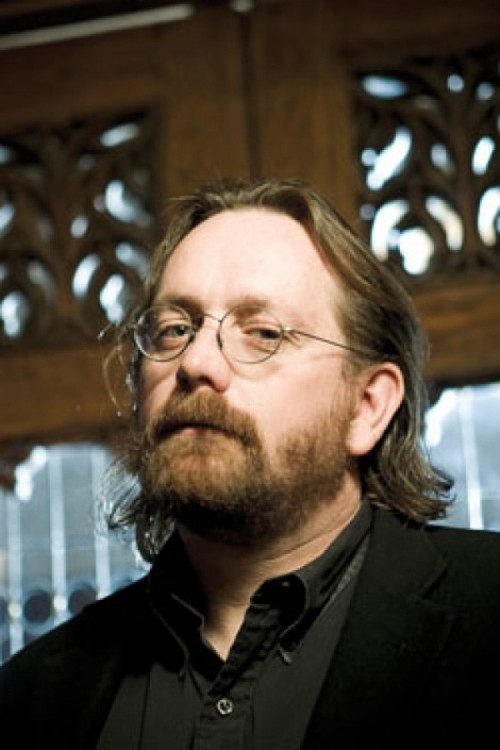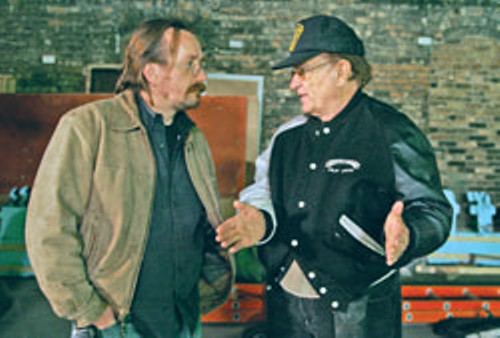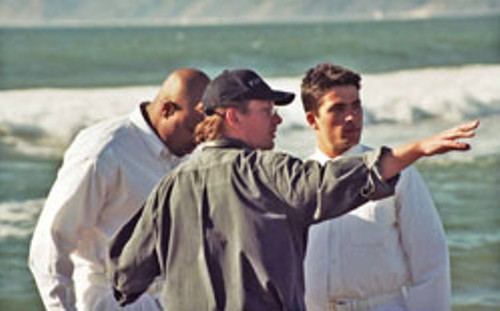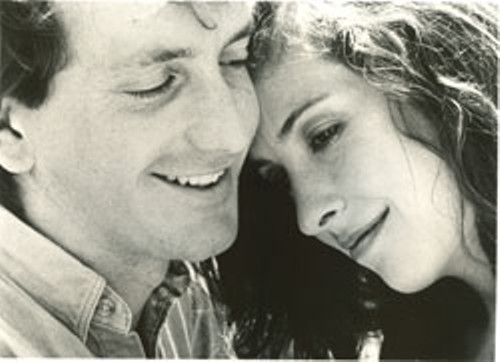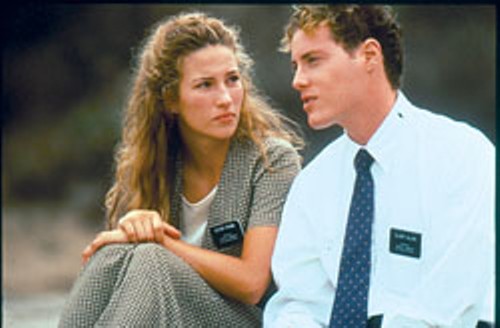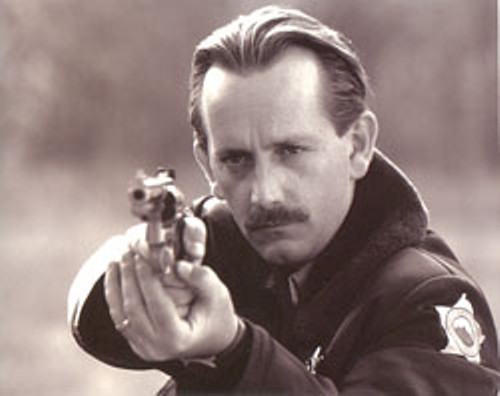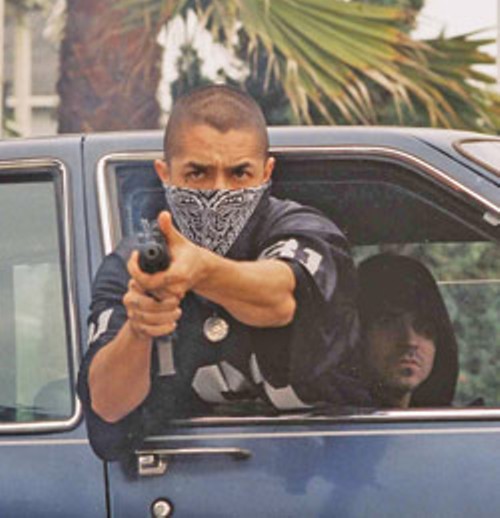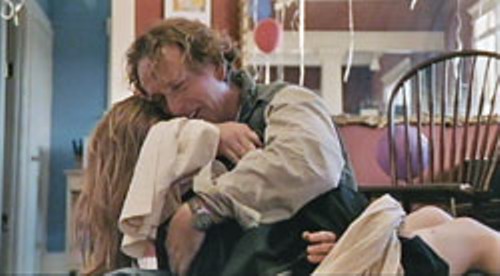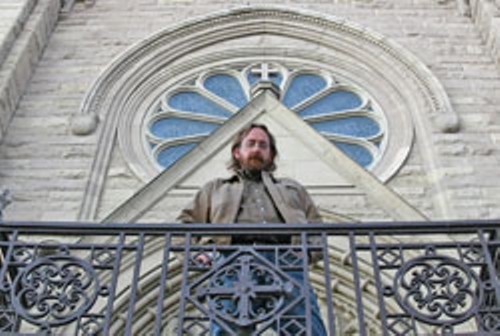Support the Free Press | Facts matter. Truth matters. Journalism matters
Salt Lake City Weekly has been Utah's source of independent news and in-depth journalism since 1984. Donate today to ensure the legacy continues.
Faith Lift
He launched LDS cinema 10 years ago. Now Richard Dutcher takes a whole new direction in spiritual filmmaking.
By Scott Renshaw @scottrenshaw
On August 9, 2007, 43-year-old Richard Dutcher—the public face of Mormon filmmaking for most of this century and the man who once held a news conference announcing plans to film a biopic about Church of Jesus Christ of Latter-day Saints founder Joseph Smith Jr.—showed his new film Falling at a special screening for the annual conference of the LDS scholarship organization Sunstone. Aside from the guy who warned Dutcher that he was “going to burn in hell,” it was a pretty good day.
The reaction couldn’t be considered shocking—because the film itself was. The filmmaker who had brought missionaries to the multiplex in God’s Army was here playing damaged soul Eric Boyle, an aspiring filmmaker who moonlights as a freelance videographer selling the ugliest possible real-life images to news outlets. Scenes of Dutcher in God’s Army serve as flashback footage here, showing Eric in a time before he had separated from his faith. In the opening scene, Eric—for fairly obvious reasons—stares skyward and sobs, “Fuck you” to God. And, at the film’s climax, a man is brutally beaten to death with a brick.
It’s a scene nearly as violent as Dutcher’s separation from a genre—the “Mo-movie”—he practically invented. In April of this year, in an open letter to Provo’s Daily Herald, Dutcher pleaded with LDS filmmakers to raise their standards for their work—and, oh, by the way, to announce that he was no longer a practicing member of the church. His filmmaking journey would henceforth include risky, personal films like Falling as well as more commercial projects like the recently completed supernatural thriller Evil Angel (which Dutcher hopes to release in spring 2008).
This openness with his audience seems characteristic of a man who has been willing to make public the most personal aspects of his life journey—his birth father’s alcoholism and infidelities; his baptism into the church when his mother remarried a Mormon; his year choosing to finish high school in Utah—living at times out of a car—after his family moved to Kansas; even his stepfather’s conviction on child molestation charges. He would never pretend to be from the squeaky-clean perfect LDS family.
Having built his Main Street Movie Company into a virtual one-man operation—he produces, writes, directs, often stars in and even distributes his own movies—Dutcher is the embodiment of independent filmmaking in a state that’s home to the country’s premier independent-film showcase. Yet, a Richard Dutcher film has never been shown at the Sundance Film Festival, and he finds himself heading into a world where the audience that had embraced him may now not know what to make of his movies.
Recently, Dutcher sat down with City Weekly in his Provo office to discuss his new movies, his faith and his future as a filmmaker.
CW: You had this one dramatic reaction at the Sunstone screening of Falling. What were reactions like overall?
RD: During [the Q&A] session, it was 95 percent positive. And then, after the Q&A, I had two people say, I really liked States of Grace, or Brigham City, and I didn’t really like this one. In both cases, I think it was people had come to expect in my films that there’s a feeling of hope or an upward swing at the end. And [in Falling]—[the ending] was a train wreck.
A BYU professor who was there, Bruce Jorgensen, wrote a really long response to the film on the Sunstone blog, [that] this is a tragedy, and went into the Greeks and Shakespeare. And, after his entry, there were all these comments like, “Oh, OK, now I get it.” For me, it was like, “I thought it was pretty obviously a tragedy!” [laughs]. But it informed us here, because maybe we need to be, in our marketing, letting people know this is a modern-day tragedy. I don’t know if that will get people to line up at the theaters to buy tickets, but they’ll go in understanding what it is.
The interesting thing to me is that I wrote this film back in 1999. I had written God’s Army, but I hadn’t shot it yet; I was still raising money for it. During this period, I thought, “I’m sick of raising money; I want to do something creative.” I’d planned to do [Falling] if I couldn’t raise the money to make God’s Army. But then it turned out that I was able … to start God’s Army. And after God’s Army did well … I was actually on my way to L.A. to do the casting [for Falling], and as I drove, that was when I had the idea for Brigham City. By the time I ended up in Los Angeles, I decided I needed to do Brigham City next.
But then, after that, Falling just kept nagging me. When I knew I was going to be shooting States of Grace down there, I just thought, “OK, I’m here, it’s an L.A. story, I’m just going to do it.” So, I was able to scrape together enough financing that, right after shooting States of Grace, I think we took a six- or seven-week break and went right into [Falling].
CW: The arc of your career wouldn’t have been quite the same if the order of your films had been different.
RD: Oh, I’m sure. [laughs]
CW: Do you feel as though Falling had to wait until now in order for it to be right?
RD: Oh, I think so. In fact, the exciting thing for me about this film is, the guy who wrote this film—me in 1999—doesn’t exist anymore. And, when I shot the film, just a few months after undergoing this collapse of my faith, I didn’t really understand it. All I knew was that what I had was gone, and you just have to keep functioning. … Then, over the course of the next couple of years, I was able to slowly edit it and put it together. So, it’s almost as though three different people made the film: The writer was this guy, and the guy who directed it was this guy, and the editor was this other guy. It’s like this collaboration with myself at different periods.
You’ve been unusually open about your personal experiences. Ideally, you don’t want [your movies] just to be The Richard Dutcher Experience; you want the viewer to pull something away from it as well. Does it make it harder if the story seems too close to your own biography?
RD: I would hope not. I’ve always felt, the more specific you are culturally, the more universal the stories become. That’s why I have no problem going into cultural or theological specifics of Mormonism because, even though it’s different from what most viewers would see, it makes it real, and it makes it something believable for an audience member. … But I guess I hadn’t really thought about it because I’m not really all that famous, you know?
People ask me sometimes why I’m in my films. … A lot of the time, it’s plain economics. Like Falling, which was so inexpensive and so close to my own personal experience, at least metaphorically. [When] you have no money to begin with and you’re crunched for time … [rather than sit] for four hours and explain to an actor what you want them to get, [it’s better] just to be able to step in and do it and move on to the next setup.
CW: When you think about continuing to make cinema about faith in some fashion, how does it feel to be writing about a universe that feels completely different from the way it felt before?
RD: What I referred to before as my collapse of faith was just a moment when … the universe shifted for me in an instant. It was one question I asked myself. … No angels came to talk to me; no devils came to talk to me; it was my own inner self answering that question. It was such a sudden and violent shift. … In cinematic terms, it was like in the movies when you’re in space and two ships, one dislodges and starts to drift away. That’s what it felt for me. I actually physically felt like my faith was just suddenly broken away, and there was nothing I could do to grab it back. And that was an absolutely terrifying moment. What do you do when the entire way you view the universe … is suddenly pulled away?
You know, I have zero suicidal tendencies, so for me it was not an option of, like, “End it all!” It was just, one day I’m in this universe and the next day I’m in this one, and I have no idea how this universe functions. So the past few years for me has just been kind of looking at the world in this new way and saying, “What is it all about?” I’m going to use [the filmmaking] process in order to try to understand what’s going on in the world, or with me in the world.
CW: It seems like filmmakers haven’t found a place for really questioning cinema about faith. How do you feel about the way faith is dealt with in general in movies?
RD: It’s basically nonexistent. It’s … preaching to the choir, or it’s more a reaction to a social structure: You’re angry at the Orthodox Jewish power structure, so you make an angry movie that attacks that. So you either have films that attack religion and spirituality or we have films that are … just promoting them.
When I think, “Who would I gather around a table like this who’s interested in the same kind of filmmaking?”—and we’re talking about living filmmakers—I don’t even know where to go, you know? But … it’s kind of exciting because here’s an area of cinema that people just aren’t interested in dealing with, and there’s such a wealth of material there.
CW: Is it just that the fear of alienating the faithful is so strong that the approach is either to ignore it, prop it up, or, as you said, just completely needle it?
RD: Boy, I could talk for an hour about that. … What I seem to find about LDS filmmakers is that they’re very serious about film as a business, but they’re not interested in film as an art form at all. They don’t understand film as an art form at all. For the past several years, I’ve been frustrated, saying, “Mormonism finally gets a chance to express itself cinematically, and look what it does.” And the thought that hit me a couple of years ago was, well, maybe I’m asking the wrong question. Maybe Mormons finally did get a chance to express themselves cinematically, and maybe they have done so. [Maybe] what we have gotten over the last eight years is a very accurate reflection of the culture. And, if that’s true, that’s something I think people should look at.
CW: Was there a time when it got wearying to you to be the go-to quote about LDS filmmaking, or did you continue to appreciate the opportunity to talk about it?
RD: I didn’t get tired of it then because I felt the message just wasn’t sinking in. But it never sank in.
What I realize now is that, when God’s Army came out … and when it succeeded, I was thrilled and announcing to everyone, “Look what we can do now.” But I remember getting up at BYU and UVSC talking to packed houses … and I said, “There’s finally a market; we can finally tell our stories.” And it hit me that all anybody heard was, “There’s a market.” And all the rest of it was just wasted breath. I think that’s what LDS filmmakers have been interested in—just the market.
Now, I’m tired of it. … I really don’t want to talk about LDS cinema anymore because I feel like I’ve been shouting in an empty room for a really long time.
CW: It seemed pretty clear to me from your Daily Herald letter that you still have a lot of concern for LDS cinema, which isn’t something you’d expect from someone who has said, “I’m done with that.”
RD: Well, I’ve been kind of thinking about that, too: Why do I still feel such a … concern? When I was trying to explain myself on a blog, [I used a] Buddhist metaphor: If you’re taking this journey and you need to cross a river, you build a raft to cross. Then, when you get to the other side of the river, you don’t say, “I’m so thankful to this raft for helping me cross this river” that you put it on your back and carry it the rest of the journey. You leave the boat there and you continue on. But you’re obviously very grateful for the boat. You’re not going to hate the boat, or tear the boat up. You just go on.
And that’s what’s been frustrating for me is that … I’ve tried to be publicly as generous as I can, refusing to go into details because I know that won’t do any good to anybody. It was like [the Daily Herald letter]; you know, I wrote all about LDS cinema, and in the last few paragraphs, I talked about my journey taking me elsewhere. And the frustrating thing for me is, I’ve heard no end of the last three paragraphs, and nobody pays any attention to what I said before. For me, those principles that I talked about—even though I may take those principles outside of Mormonism as far as the kind of films that I should make—I feel those are very valuable.
CW: On your Website, you mention the reaction you had to a college professor’s quote that “the first great Mormon writer will be excommunicated from the Church.” Without putting you in the position of claiming to be that “first great Mormon writer,” were you thinking, even if you hadn’t had this personal epiphany, there would come a moment where you would collide with this wall so hard that something would have to give?
RD: Oh, yeah, I absolutely knew that was coming. I think that’s why that professor’s statement really resonated with me. … I just knew that as a filmmaker, if I was always stuck in an area where I never said fuck or goddamn, and you never see a naked woman, and nothing ever gets too violent, that that would not be beneficial to me as a filmmaker. I’d need to go out and find out what for me, personally, was right and wrong. … So what I found in filmmaking is that these things that were taboos, I don’t have any problem with [them]. … Filming these scenes did not feel in any way like committing sins.
I always knew, though, that when it came down to it, I wouldn’t be able to sit at a table with 12 men and have those 12 men say, “Stop making these kinds of films.” I would just say, “I appreciate your point of view and your sincerity, and now I’m going my own way.” … Right after Brigham City and States of Grace, I still had people coming up to me and saying, “It’s so nice that you’re making family films.” And I always felt frustrated, because it was like, “Are you not paying attention?”
I wrote Falling in 1999, and I knew where I was going. I knew that it was inevitable; that’s why I think I was a little reluctant at the beginning when people were sometimes overly praising the religious aspects [of God’s Army]. People were saying, “Oh, God’s Army is just a recruiting tool,” and I was like, “OK, see if you say that again in six or seven years.” So I think that was why I was always a little uncomfortable with the Mormon community owning me too much, because I knew that this was going to come.
CW: Does it feel now like you’re making films that are not religious enough for the religious audience but too religious for the Sundance audience, which seems kind of like Falling’s natural fit?
RD: Falling was, from its very inception, you know, I am not making this for any market. … And in the process, whenever there was a decision to make, … whether it was casting a certain person, or doing this or not doing this, I would always just say, “OK, that’s the commercial decision and this is the not-commercial decision, and I’ll make the not-commercial decision.” In a way, it’s something of an experiment for me, because who makes a film that every step along the way—everybody makes the opposite decision: “Whatever’s commercial, OK, that’s what we do.” For this one, I thought, “What’s commercial? OK, let’s do something else.”
And I have no illusions that this film is going to be a Titanic at the box office. I would like it to be a small success, but that’s kind of my experiment. If filmmakers make this kind of film, where they’re not catering to audience demands or market demands in any way, will you make something that’s so unique that it will actually draw people?
CW: You’ve submitted previous films to Sundance, unsuccessfully. Does it feel to you like maybe this one is the one?
RD: I would sure hope so, because if this isn’t it, … [laughs]. After the [Sunstone] screening, some of the comments I got were like, “You know, you’ll have better luck if you take out some of that Christus stuff at the end; you’ll get into the festivals.” And it’s like, festivals are just one more market, if you look at it that way. I’m not going to say, “Here’s the film, and it’s just as I want it,” but, if I take out something that I think is a vitally important part of it just to satisfy some festival programmers … well, screw that. I became very aware since God’s Army came out of the critical resistance—and audience resistance—to films not just with religious content, but with spiritual content. But I can’t change what I’m doing to satisfy that.
Right now, … for me, there are two kinds of films I’m making. One type is just purely commercial films, and the other type is very personal films. And I don’t want to pollute one or the other. … Now if you look at someone like [independent filmmaking pioneer John] Cassavetes, he would say, “Well, it’s impossible, you’re not going to be able to do it. You’ll get hooked on the Hollywood tit, and you’ll never be able to leave.” … And I hope that he’s wrong because, personally, I don’t see how to do those other films unless you’re either independently wealthy—which I’m not—or you finance it through doing something more commercial. That’s what he said, but I don’t know if he really believed that because, near the end of his life … as an actor, he could go out and do whatever garbage they’d give him a check for, and then he would take that money and go make a film with it.
CW: So does Provo, Utah, still feel like the right place for you?
RD: Yeah, it does, actually. I spent 10 years [in Los Angeles] and going back now holds no appeal. The culture there is so removed from the act and art of making films that I never want to be a part of it. The things that dominate your life down there have nothing to do with making films. And, for some reason, there’s a culture of assholery—why are these people all rude, mean, unhappy people?
I came back [to Utah], I think, in my ninth year of living in L.A…. trying to raise money. Late at night I stepped out on the street; the stars were really bright that night, and I could see the mountains, and the air was clean. And it was so heartbreakingly beautiful after almost 10 years of smog and just … L.A. that I knew if I didn’t live here, I’d have to live somewhere that you could wake up in the morning and see a mountain, have a nice quality of life. And … with seven kids now, L.A. is not an option.
It’s interesting to me in looking at what I’m building here. It started off with me as an actor … realizing if I wanted to do something interesting, I’d probably have to write it myself. Then, eventually … even though people liked my scripts, nobody was making them, so I realized I’d have to produce them myself. And if I’m producing, I’m sure as hell going to direct. … And then, if you want to stay in the business, you’ve got to have a lot of control of the distribution, so I formed the distribution side of it. It’s been a natural evolution and yet very necessary. I can’t see now trying to make a living just as a writer, or just as an actor, or just as a director. It’s, like, virtually impossible. At least for me, because I’m not a 19-year-old, hot, young girl, I’ve got to actually create the whole thing. I’m not high in demand in the marketplace.
After creating all these relationships with exhibitors, now I am finally really in a place that, as long as I have the marketing dollars to back it up, I could open on 1,500 screens. And that would be kinda fun—just to sneak in and take the weekend away from all the big boys in Hollywood. I think Evil Angel’s got a good shot at it. It’s fun. And there’s another film we’re putting together now to shoot next spring, and I think that’s even more commercial. So, Main Street, I don’t intend for it to be just kind of a boutique, small thing. I want to come in and play in the majors.
Richard Dutcher Filmography
A brief look at Dutcher’s films, with his own observations on them.
Girl Crazy
(1997)
Dutcher wrote his first role for himself in this romantic comedy, playing a womanizer who needs to learn to settle down and be faithful. “Better than any graduate school in the world, Girl Crazy taught me more about filmmaking than I could have learned anywhere.”
God’s Army
(2000)
In the feature that made his name, Dutcher played a cancer-stricken missionary in Los Angeles serving as mentor to a new arrival (Matthew A. Brown). “I put everything on the line for this film. I was absolutely sure it would work.”
Brigham City
(2001)
Dutcher ventures into murder mystery, playing a small-town Utah sheriff investigating a series of killings. “From conception to premiere, it took less than nine months. My fastest film.”
States of Grace
(2005)
Marketed locally as God’s Army 2, this stand-alone follow-up dealt with the intersecting lives of Southern California missionaries and those they attempt to serve. “Said everything I wanted to say about religion ... at that point in my life.”
Falling
(expected 2008)
An aspiring filmmaker and his aspiring-actress wife face moral choices that will change their lives. “Making it almost broke me physically, mentally and spiritually. It has become my favorite film.”
Evil Angel
(expected 2008)
Dutcher cast Ving Rhames (Pulp Fiction) in a supernatural thriller he describes as based on the Lilith myth. “States of Grace was my Christmas movie. This is my Halloween movie. Guns, blood, demons and just a little theology.”
cw
The reaction couldn’t be considered shocking—because the film itself was. The filmmaker who had brought missionaries to the multiplex in God’s Army was here playing damaged soul Eric Boyle, an aspiring filmmaker who moonlights as a freelance videographer selling the ugliest possible real-life images to news outlets. Scenes of Dutcher in God’s Army serve as flashback footage here, showing Eric in a time before he had separated from his faith. In the opening scene, Eric—for fairly obvious reasons—stares skyward and sobs, “Fuck you” to God. And, at the film’s climax, a man is brutally beaten to death with a brick.
It’s a scene nearly as violent as Dutcher’s separation from a genre—the “Mo-movie”—he practically invented. In April of this year, in an open letter to Provo’s Daily Herald, Dutcher pleaded with LDS filmmakers to raise their standards for their work—and, oh, by the way, to announce that he was no longer a practicing member of the church. His filmmaking journey would henceforth include risky, personal films like Falling as well as more commercial projects like the recently completed supernatural thriller Evil Angel (which Dutcher hopes to release in spring 2008).
This openness with his audience seems characteristic of a man who has been willing to make public the most personal aspects of his life journey—his birth father’s alcoholism and infidelities; his baptism into the church when his mother remarried a Mormon; his year choosing to finish high school in Utah—living at times out of a car—after his family moved to Kansas; even his stepfather’s conviction on child molestation charges. He would never pretend to be from the squeaky-clean perfect LDS family.
Having built his Main Street Movie Company into a virtual one-man operation—he produces, writes, directs, often stars in and even distributes his own movies—Dutcher is the embodiment of independent filmmaking in a state that’s home to the country’s premier independent-film showcase. Yet, a Richard Dutcher film has never been shown at the Sundance Film Festival, and he finds himself heading into a world where the audience that had embraced him may now not know what to make of his movies.
Recently, Dutcher sat down with City Weekly in his Provo office to discuss his new movies, his faith and his future as a filmmaker.
CW: You had this one dramatic reaction at the Sunstone screening of Falling. What were reactions like overall?
RD: During [the Q&A] session, it was 95 percent positive. And then, after the Q&A, I had two people say, I really liked States of Grace, or Brigham City, and I didn’t really like this one. In both cases, I think it was people had come to expect in my films that there’s a feeling of hope or an upward swing at the end. And [in Falling]—[the ending] was a train wreck.
A BYU professor who was there, Bruce Jorgensen, wrote a really long response to the film on the Sunstone blog, [that] this is a tragedy, and went into the Greeks and Shakespeare. And, after his entry, there were all these comments like, “Oh, OK, now I get it.” For me, it was like, “I thought it was pretty obviously a tragedy!” [laughs]. But it informed us here, because maybe we need to be, in our marketing, letting people know this is a modern-day tragedy. I don’t know if that will get people to line up at the theaters to buy tickets, but they’ll go in understanding what it is.
The interesting thing to me is that I wrote this film back in 1999. I had written God’s Army, but I hadn’t shot it yet; I was still raising money for it. During this period, I thought, “I’m sick of raising money; I want to do something creative.” I’d planned to do [Falling] if I couldn’t raise the money to make God’s Army. But then it turned out that I was able … to start God’s Army. And after God’s Army did well … I was actually on my way to L.A. to do the casting [for Falling], and as I drove, that was when I had the idea for Brigham City. By the time I ended up in Los Angeles, I decided I needed to do Brigham City next.
But then, after that, Falling just kept nagging me. When I knew I was going to be shooting States of Grace down there, I just thought, “OK, I’m here, it’s an L.A. story, I’m just going to do it.” So, I was able to scrape together enough financing that, right after shooting States of Grace, I think we took a six- or seven-week break and went right into [Falling].
CW: The arc of your career wouldn’t have been quite the same if the order of your films had been different.
RD: Oh, I’m sure. [laughs]
CW: Do you feel as though Falling had to wait until now in order for it to be right?
RD: Oh, I think so. In fact, the exciting thing for me about this film is, the guy who wrote this film—me in 1999—doesn’t exist anymore. And, when I shot the film, just a few months after undergoing this collapse of my faith, I didn’t really understand it. All I knew was that what I had was gone, and you just have to keep functioning. … Then, over the course of the next couple of years, I was able to slowly edit it and put it together. So, it’s almost as though three different people made the film: The writer was this guy, and the guy who directed it was this guy, and the editor was this other guy. It’s like this collaboration with myself at different periods.
You’ve been unusually open about your personal experiences. Ideally, you don’t want [your movies] just to be The Richard Dutcher Experience; you want the viewer to pull something away from it as well. Does it make it harder if the story seems too close to your own biography?
RD: I would hope not. I’ve always felt, the more specific you are culturally, the more universal the stories become. That’s why I have no problem going into cultural or theological specifics of Mormonism because, even though it’s different from what most viewers would see, it makes it real, and it makes it something believable for an audience member. … But I guess I hadn’t really thought about it because I’m not really all that famous, you know?
People ask me sometimes why I’m in my films. … A lot of the time, it’s plain economics. Like Falling, which was so inexpensive and so close to my own personal experience, at least metaphorically. [When] you have no money to begin with and you’re crunched for time … [rather than sit] for four hours and explain to an actor what you want them to get, [it’s better] just to be able to step in and do it and move on to the next setup.
CW: When you think about continuing to make cinema about faith in some fashion, how does it feel to be writing about a universe that feels completely different from the way it felt before?
RD: What I referred to before as my collapse of faith was just a moment when … the universe shifted for me in an instant. It was one question I asked myself. … No angels came to talk to me; no devils came to talk to me; it was my own inner self answering that question. It was such a sudden and violent shift. … In cinematic terms, it was like in the movies when you’re in space and two ships, one dislodges and starts to drift away. That’s what it felt for me. I actually physically felt like my faith was just suddenly broken away, and there was nothing I could do to grab it back. And that was an absolutely terrifying moment. What do you do when the entire way you view the universe … is suddenly pulled away?
You know, I have zero suicidal tendencies, so for me it was not an option of, like, “End it all!” It was just, one day I’m in this universe and the next day I’m in this one, and I have no idea how this universe functions. So the past few years for me has just been kind of looking at the world in this new way and saying, “What is it all about?” I’m going to use [the filmmaking] process in order to try to understand what’s going on in the world, or with me in the world.
CW: It seems like filmmakers haven’t found a place for really questioning cinema about faith. How do you feel about the way faith is dealt with in general in movies?
RD: It’s basically nonexistent. It’s … preaching to the choir, or it’s more a reaction to a social structure: You’re angry at the Orthodox Jewish power structure, so you make an angry movie that attacks that. So you either have films that attack religion and spirituality or we have films that are … just promoting them.
When I think, “Who would I gather around a table like this who’s interested in the same kind of filmmaking?”—and we’re talking about living filmmakers—I don’t even know where to go, you know? But … it’s kind of exciting because here’s an area of cinema that people just aren’t interested in dealing with, and there’s such a wealth of material there.
CW: Is it just that the fear of alienating the faithful is so strong that the approach is either to ignore it, prop it up, or, as you said, just completely needle it?
RD: Boy, I could talk for an hour about that. … What I seem to find about LDS filmmakers is that they’re very serious about film as a business, but they’re not interested in film as an art form at all. They don’t understand film as an art form at all. For the past several years, I’ve been frustrated, saying, “Mormonism finally gets a chance to express itself cinematically, and look what it does.” And the thought that hit me a couple of years ago was, well, maybe I’m asking the wrong question. Maybe Mormons finally did get a chance to express themselves cinematically, and maybe they have done so. [Maybe] what we have gotten over the last eight years is a very accurate reflection of the culture. And, if that’s true, that’s something I think people should look at.
CW: Was there a time when it got wearying to you to be the go-to quote about LDS filmmaking, or did you continue to appreciate the opportunity to talk about it?
RD: I didn’t get tired of it then because I felt the message just wasn’t sinking in. But it never sank in.
What I realize now is that, when God’s Army came out … and when it succeeded, I was thrilled and announcing to everyone, “Look what we can do now.” But I remember getting up at BYU and UVSC talking to packed houses … and I said, “There’s finally a market; we can finally tell our stories.” And it hit me that all anybody heard was, “There’s a market.” And all the rest of it was just wasted breath. I think that’s what LDS filmmakers have been interested in—just the market.
Now, I’m tired of it. … I really don’t want to talk about LDS cinema anymore because I feel like I’ve been shouting in an empty room for a really long time.
CW: It seemed pretty clear to me from your Daily Herald letter that you still have a lot of concern for LDS cinema, which isn’t something you’d expect from someone who has said, “I’m done with that.”
RD: Well, I’ve been kind of thinking about that, too: Why do I still feel such a … concern? When I was trying to explain myself on a blog, [I used a] Buddhist metaphor: If you’re taking this journey and you need to cross a river, you build a raft to cross. Then, when you get to the other side of the river, you don’t say, “I’m so thankful to this raft for helping me cross this river” that you put it on your back and carry it the rest of the journey. You leave the boat there and you continue on. But you’re obviously very grateful for the boat. You’re not going to hate the boat, or tear the boat up. You just go on.
And that’s what’s been frustrating for me is that … I’ve tried to be publicly as generous as I can, refusing to go into details because I know that won’t do any good to anybody. It was like [the Daily Herald letter]; you know, I wrote all about LDS cinema, and in the last few paragraphs, I talked about my journey taking me elsewhere. And the frustrating thing for me is, I’ve heard no end of the last three paragraphs, and nobody pays any attention to what I said before. For me, those principles that I talked about—even though I may take those principles outside of Mormonism as far as the kind of films that I should make—I feel those are very valuable.
CW: On your Website, you mention the reaction you had to a college professor’s quote that “the first great Mormon writer will be excommunicated from the Church.” Without putting you in the position of claiming to be that “first great Mormon writer,” were you thinking, even if you hadn’t had this personal epiphany, there would come a moment where you would collide with this wall so hard that something would have to give?
RD: Oh, yeah, I absolutely knew that was coming. I think that’s why that professor’s statement really resonated with me. … I just knew that as a filmmaker, if I was always stuck in an area where I never said fuck or goddamn, and you never see a naked woman, and nothing ever gets too violent, that that would not be beneficial to me as a filmmaker. I’d need to go out and find out what for me, personally, was right and wrong. … So what I found in filmmaking is that these things that were taboos, I don’t have any problem with [them]. … Filming these scenes did not feel in any way like committing sins.
I always knew, though, that when it came down to it, I wouldn’t be able to sit at a table with 12 men and have those 12 men say, “Stop making these kinds of films.” I would just say, “I appreciate your point of view and your sincerity, and now I’m going my own way.” … Right after Brigham City and States of Grace, I still had people coming up to me and saying, “It’s so nice that you’re making family films.” And I always felt frustrated, because it was like, “Are you not paying attention?”
I wrote Falling in 1999, and I knew where I was going. I knew that it was inevitable; that’s why I think I was a little reluctant at the beginning when people were sometimes overly praising the religious aspects [of God’s Army]. People were saying, “Oh, God’s Army is just a recruiting tool,” and I was like, “OK, see if you say that again in six or seven years.” So I think that was why I was always a little uncomfortable with the Mormon community owning me too much, because I knew that this was going to come.
CW: Does it feel now like you’re making films that are not religious enough for the religious audience but too religious for the Sundance audience, which seems kind of like Falling’s natural fit?
RD: Falling was, from its very inception, you know, I am not making this for any market. … And in the process, whenever there was a decision to make, … whether it was casting a certain person, or doing this or not doing this, I would always just say, “OK, that’s the commercial decision and this is the not-commercial decision, and I’ll make the not-commercial decision.” In a way, it’s something of an experiment for me, because who makes a film that every step along the way—everybody makes the opposite decision: “Whatever’s commercial, OK, that’s what we do.” For this one, I thought, “What’s commercial? OK, let’s do something else.”
And I have no illusions that this film is going to be a Titanic at the box office. I would like it to be a small success, but that’s kind of my experiment. If filmmakers make this kind of film, where they’re not catering to audience demands or market demands in any way, will you make something that’s so unique that it will actually draw people?
CW: You’ve submitted previous films to Sundance, unsuccessfully. Does it feel to you like maybe this one is the one?
RD: I would sure hope so, because if this isn’t it, … [laughs]. After the [Sunstone] screening, some of the comments I got were like, “You know, you’ll have better luck if you take out some of that Christus stuff at the end; you’ll get into the festivals.” And it’s like, festivals are just one more market, if you look at it that way. I’m not going to say, “Here’s the film, and it’s just as I want it,” but, if I take out something that I think is a vitally important part of it just to satisfy some festival programmers … well, screw that. I became very aware since God’s Army came out of the critical resistance—and audience resistance—to films not just with religious content, but with spiritual content. But I can’t change what I’m doing to satisfy that.
Right now, … for me, there are two kinds of films I’m making. One type is just purely commercial films, and the other type is very personal films. And I don’t want to pollute one or the other. … Now if you look at someone like [independent filmmaking pioneer John] Cassavetes, he would say, “Well, it’s impossible, you’re not going to be able to do it. You’ll get hooked on the Hollywood tit, and you’ll never be able to leave.” … And I hope that he’s wrong because, personally, I don’t see how to do those other films unless you’re either independently wealthy—which I’m not—or you finance it through doing something more commercial. That’s what he said, but I don’t know if he really believed that because, near the end of his life … as an actor, he could go out and do whatever garbage they’d give him a check for, and then he would take that money and go make a film with it.
CW: So does Provo, Utah, still feel like the right place for you?
RD: Yeah, it does, actually. I spent 10 years [in Los Angeles] and going back now holds no appeal. The culture there is so removed from the act and art of making films that I never want to be a part of it. The things that dominate your life down there have nothing to do with making films. And, for some reason, there’s a culture of assholery—why are these people all rude, mean, unhappy people?
I came back [to Utah], I think, in my ninth year of living in L.A…. trying to raise money. Late at night I stepped out on the street; the stars were really bright that night, and I could see the mountains, and the air was clean. And it was so heartbreakingly beautiful after almost 10 years of smog and just … L.A. that I knew if I didn’t live here, I’d have to live somewhere that you could wake up in the morning and see a mountain, have a nice quality of life. And … with seven kids now, L.A. is not an option.
It’s interesting to me in looking at what I’m building here. It started off with me as an actor … realizing if I wanted to do something interesting, I’d probably have to write it myself. Then, eventually … even though people liked my scripts, nobody was making them, so I realized I’d have to produce them myself. And if I’m producing, I’m sure as hell going to direct. … And then, if you want to stay in the business, you’ve got to have a lot of control of the distribution, so I formed the distribution side of it. It’s been a natural evolution and yet very necessary. I can’t see now trying to make a living just as a writer, or just as an actor, or just as a director. It’s, like, virtually impossible. At least for me, because I’m not a 19-year-old, hot, young girl, I’ve got to actually create the whole thing. I’m not high in demand in the marketplace.
After creating all these relationships with exhibitors, now I am finally really in a place that, as long as I have the marketing dollars to back it up, I could open on 1,500 screens. And that would be kinda fun—just to sneak in and take the weekend away from all the big boys in Hollywood. I think Evil Angel’s got a good shot at it. It’s fun. And there’s another film we’re putting together now to shoot next spring, and I think that’s even more commercial. So, Main Street, I don’t intend for it to be just kind of a boutique, small thing. I want to come in and play in the majors.
Richard Dutcher Filmography
A brief look at Dutcher’s films, with his own observations on them.
Girl Crazy
(1997)
Dutcher wrote his first role for himself in this romantic comedy, playing a womanizer who needs to learn to settle down and be faithful. “Better than any graduate school in the world, Girl Crazy taught me more about filmmaking than I could have learned anywhere.”
God’s Army
(2000)
In the feature that made his name, Dutcher played a cancer-stricken missionary in Los Angeles serving as mentor to a new arrival (Matthew A. Brown). “I put everything on the line for this film. I was absolutely sure it would work.”
Brigham City
(2001)
Dutcher ventures into murder mystery, playing a small-town Utah sheriff investigating a series of killings. “From conception to premiere, it took less than nine months. My fastest film.”
States of Grace
(2005)
Marketed locally as God’s Army 2, this stand-alone follow-up dealt with the intersecting lives of Southern California missionaries and those they attempt to serve. “Said everything I wanted to say about religion ... at that point in my life.”
Falling
(expected 2008)
An aspiring filmmaker and his aspiring-actress wife face moral choices that will change their lives. “Making it almost broke me physically, mentally and spiritually. It has become my favorite film.”
Evil Angel
(expected 2008)
Dutcher cast Ving Rhames (Pulp Fiction) in a supernatural thriller he describes as based on the Lilith myth. “States of Grace was my Christmas movie. This is my Halloween movie. Guns, blood, demons and just a little theology.”
cw
More by Scott Renshaw
-
Feature film review: THE BEAST
A filmmaker's compelling ideas get a bit tangled in references to his creative influences.
- Apr 17, 2024
-
Faces of Salt Lake County book and portrait reception
Images and personal stories in a new book reveal local demographic diversity
- Apr 17, 2024
-
Film Reviews: New Releases for April 12
Civil War, Escape from Germany, Coup de Chance, Hundreds of Beavers, La Chimera, Sting
- Apr 11, 2024
- More »
Latest in Cover Story
Readers also liked…
-
Forget the family pedigree—Robert F. Kennedy Jr should not be the next president of the United States
Trojan Horse
- Jun 21, 2023
-
Women decry harassment and toxic culture at St. George auto dealership
Men at Work
- Oct 11, 2023


